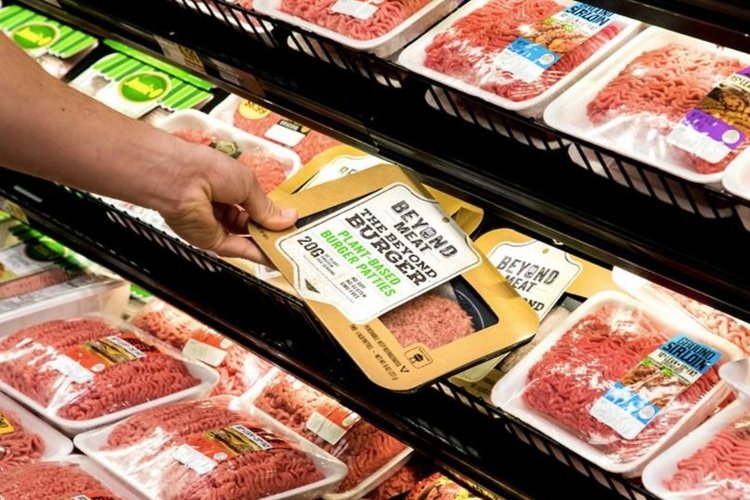The Great Protein War of 2019

The great “protein war” is heating up, as several major restaurant chains are embracing the plant-based movement while others are firmly positioning themselves as guardians of the mighty meat-eater. It’s getting confusing with all these announcements, hard to keep track
Sylvain Charlebois – PostMedia Network
A&W, Canada’s first Beyond Meat ambassador, started it all a little over 12 months ago with its surprisingly successful Beyond Burger campaign. Since then, grocers have all jumped on the Beyond Meat bandwagon, but now many other chains are making their position on plant-based dieting quite public — so much so that A&W’s pioneering move has somewhat been lost in all the plant-based noise. In cattle country, where A&W was hated as much as the taxman, beef producers now have many targets to chose from. Tim Horton’s, Burger King and Subway, just to name a few, have all embraced plant-based products in recent months.
The case made by Restaurant Brands International (RBI) is interesting. Tim Horton’s and Burger King, both owned by RBI, appear to be hedging on plant-based dieting. Early in the summer, Tim Horton’s was adding many Beyond Meat products to its menu while Burger King introduced the Impossible Whopper, using Impossible Foods’ patties; both chains are going plant-based, but with different companies.
“The summer of 2019 has become a high point in the so-called “protein war,” our divisive quest to see a more pluralistic protein marketplace”
Both Beyond Meat and Impossible Foods, the two leading contenders for top supplier of plant-based products, have had a busy summer. As soon as Burger King announced its partnership with Impossible Foods, Beyond Meat made public its association with another major restaurant chain, Subway, and a few weeks after this it finalized its partnership with Dunkin Donuts. Then, the American-based Institutional food prep giant Sodexo announced it was working with Impossible Foods.
Confused yet? Not a week goes by these days that we don’t hear about a major chain going plant-based.
Tim Horton’s commitment to Beyond Meat points to how inclusive the chain wants to be. Tim Horton’s is mostly known for its non-meat offering and now is offering something for everyone. Burger King’s case is a little more complicated, since it makes its money selling mostly burgers. After running pilot programs for a few months in different American markets, it is now offering the Impossible Whopper to its customers, across the U.S.A. It did not take long for skeptics to criticize Burger King’s plant-based move.
Some vegans make the point that the chain intends to cook Impossible Whopper patties on the same grill as patties from “dead cows.” As a result, Burger King is now giving a choice to customers and they can have their Impossible Whopper patties cooked separately if desired. Simply adding a plant-based option on the menu is no longer enough; chains are now made accountable for what goes on in the kitchen as well.
Burger King’s decision to partner with Impossible Foods may seem surprising for some, but the chain was clearly motivated by McDonald’s very public stance on meat consumption. As Chipotle and Arby’s did earlier this summer, McDonalds’s is doubling down on beef and has no intention to offer meat alternatives anytime soon. In fact, McDonald’s is now selling an enhanced version of its Big Mac and the ads are everywhere — an obvious, direct response to what we have seen since last year’s Beyond Burger launch by A&W.
Seeing McDonald’s Canada going in another direction would have been surprising. For a long time, McDonalds’ Canada has prided itself on promoting Canadian beef and other commodities grown and produced in the country. It would have been awkward to see McDonald’s adding any plant-based products to its menu.
McDonald’s Canada is also a key stakeholder in the Canadian Roundtable for Sustainable Beef, an initiative launched to give beef a greener reputation. Its commitment to beef and its customer base remains the same. In 2003, McDonald’s offered a less-than-decent veggie-burger. The product was awful and was dropped a few years later as if its failure was almost by design. The chain clearly has no intention to lure flexitarians who are looking for “fake” animal proteins any time soon.
The summer of 2019 has become a high point in the so-called “protein war,” our divisive quest to see a more pluralistic protein marketplace. The narrative of how the food service industry is using the emergence of plant-based dieting as a lightning rod seems to be polarizing our collective discussion about the future of proteins even more.
Beyond Meat, Impossible Foods, Maple Leaf Foods with its Light Life product, Montreal-based Vegeats, and many other plant-based product providers are trying to democratize the notion of proteins. As a result, we are seeing more innovation coming from the food industry than we have in the last 20 years. We are seeing the rise of a brand-new section in the grocery store, a first in many years. Proteins are making everyone in the food industry think differently about their products, at the meat counter and beyond.
We should be thankful for what is happening, but let’s hope a truce in the protein war occurs soon. A divisive debate is never desirable, especially when food is involved.
Source: Dr. Sylvain Charlebois is the Director of the Agri-Food Analytics Lab for Food Distribution and Policy at Dalhousie University











